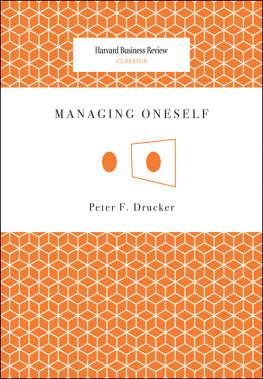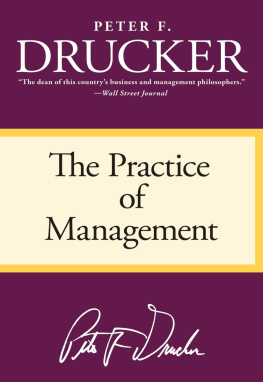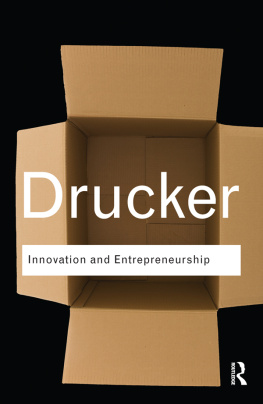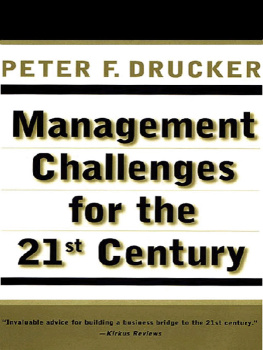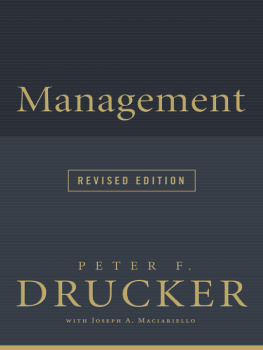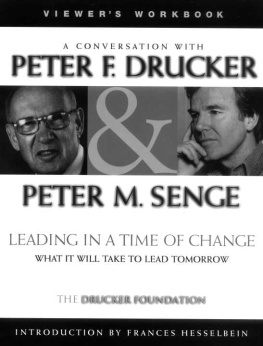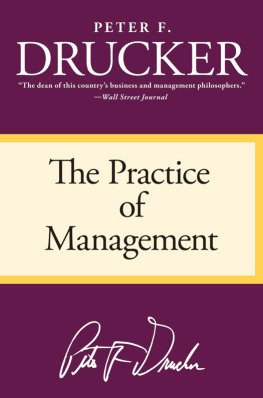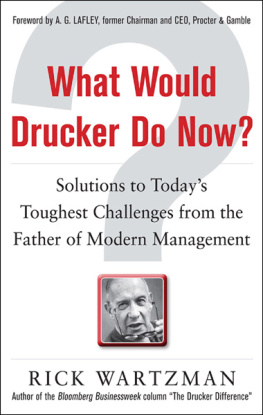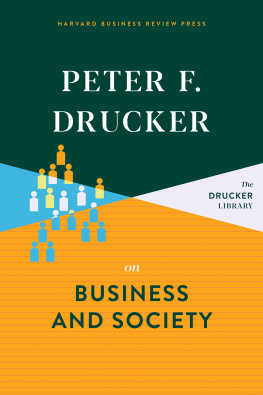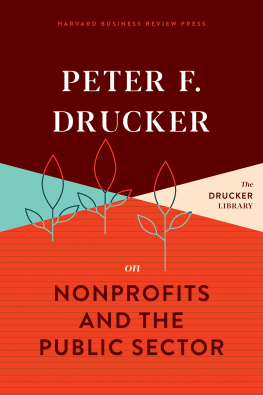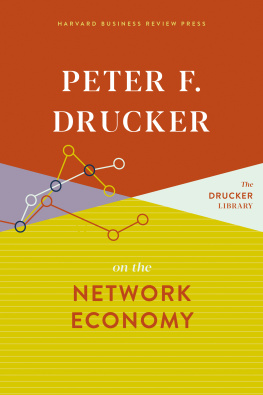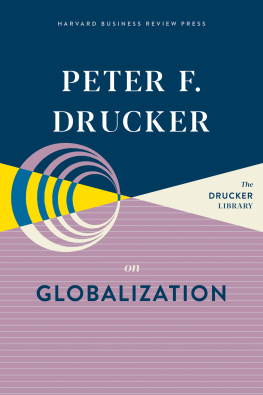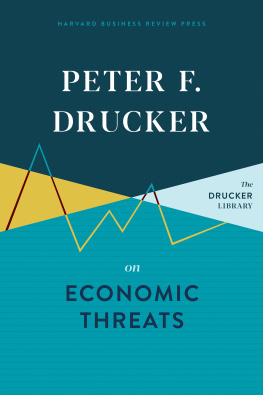Drucker - Managing in the Next Society
Here you can read online Drucker - Managing in the Next Society full text of the book (entire story) in english for free. Download pdf and epub, get meaning, cover and reviews about this ebook. City: London;New York, year: 2016;2012, publisher: Routledge Taylor & Francis Group, genre: Politics. Description of the work, (preface) as well as reviews are available. Best literature library LitArk.com created for fans of good reading and offers a wide selection of genres:
Romance novel
Science fiction
Adventure
Detective
Science
History
Home and family
Prose
Art
Politics
Computer
Non-fiction
Religion
Business
Children
Humor
Choose a favorite category and find really read worthwhile books. Enjoy immersion in the world of imagination, feel the emotions of the characters or learn something new for yourself, make an fascinating discovery.

Managing in the Next Society: summary, description and annotation
We offer to read an annotation, description, summary or preface (depends on what the author of the book "Managing in the Next Society" wrote himself). If you haven't found the necessary information about the book — write in the comments, we will try to find it.
Drucker: author's other books
Who wrote Managing in the Next Society? Find out the surname, the name of the author of the book and a list of all author's works by series.
Managing in the Next Society — read online for free the complete book (whole text) full work
Below is the text of the book, divided by pages. System saving the place of the last page read, allows you to conveniently read the book "Managing in the Next Society" online for free, without having to search again every time where you left off. Put a bookmark, and you can go to the page where you finished reading at any time.
Font size:
Interval:
Bookmark:
Next Society

First published 2002 by Butterworth-Heinemann
Classic Drucker Collection edition 2007
Published 2013 by Routledge
2 Park Square, Milton Park, Abingdon, Oxon OX14 4RN
711 Third Avenue, New York, NY, 10017, USA
Routledge is an imprint of the Taylor & Francis Group, an informa business
Copyright 2002, Peter F. Drucker. Published by Taylor & Francis. All rights reserved.
Foreword Copyright 2007 Alistair Mant and Cary Copper. All rights reserved.
The right of Peter F. Drucker to be identified as the author of this work has been asserted in accordance with the Copyright, Designs and Patents Act 1988
No part of this book may be reprinted or reproduced or utilised in any form or by any electronic, mechanical, or other means, now known or hereafter invented, including photocopying and recording, or in any information storage or retrieval system, without permission in writing from the publishers.
Notices
No responsibility is assumed by the publisher for any injury and/or damage to persons or property as a matter of products liability, negligence or otherwise, or from any use or operation of any methods, products, instructions or ideas contained in the material herein. Because of rapid advances in the medical sciences, in particular, independent verification of diagnoses and drug dosages should be made.
Practitioners and researchers must always rely on their own experience and knowledge in evaluating and using any information, methods, compounds, or experiments described herein. In using such information or methods they should be mindful of their own safety and the safety of others, including parties for whom they have a professional responsibility.
Product or corporate names may be trademarks or registered trademarks, and are used only for identification and explanation without intent to infringe.
British Library Cataloguing in Publication Data
A catalogue record for this book is available from the British Library
Library of Congress Cataloging in Publication Data
A catalogue record for this book is available from the Library of Congress
ISBN-13: 978-0-7506-8505-4 (pbk)
ISBN-13: 978-0-080-94237-7 (ebk)
Typeset by Charon Tec Ltd (A Macmillan Company), Chennai, India
www.charontec.com

Peter F. Drucker
19092005
To all managers and leaders, students and teachers who have benefited from Peters teaching .
Doris Drucker
| 1. |
| 2. |
| 3. |
| 4. |
| 5. |
| 6. |
| 7. |
| 8. |
| 9. |
| 10. |
| 11. |
| 12. |
| 13. |
| 14. |
| 15. |
I am writing this appreciation in harness with Professor Cary Cooper an ex-pat American in Europe. I am an ex-pat Australian in Europe and our subject is an ex-pat Austrian in the USA. So its no surprise that our main theme is Peter Druckers cosmopolitanism. After the Second World War, he was virtually the only influential American writer on business who was not entrapped in self-congratulatory admiration of the American way of doing business. He befriended big business in order to offer it constructive criticism. He never, quite, disgraced himself in the eyes of the corporate behemoths, though his instincts were invariably mischievous.
I met Peter Drucker but twice and I agree with Jim Collins that what marked him out was his relentless interest in all that was going on around him. He was one of the best and sharpest listeners I have ever met. At the time of writing, I eagerly anticipate sharing a platform with his widow Doris later this year. The Australian Institute of Management in its great wisdom has seen fit to dedicate its national convention this year (2007) to a celebration of Peters work. No one should be surprised to learn that the title of Doris memoir is Invent Radium or Ill pull Your Hair . I am not making this up; what kind of wonderful woman would Drucker marry anyway?
I was fortunate enough to meet up with Peter in Claremont College, many years ago now. I was visiting UCLA (my old alma mater) and other universities in the greater LA area, intending to see what was happening at Pomona Claremont Colleges in the business and psychology fields. But just by chance, I literally ran into him and then ended up spending nearly the afternoon talking to him about every topic under the proverbial sun! Prior to meeting him, I had a stereotypical view of him which was wholly transformed after this chance meeting. Rather than being on transmit, extolling his own virtues and achievements, he was totally on receive, listening intently to me, asking me about what was happening in the UK and Europe, and not only about business and management, but about politics, ethics, lifestyles, etc. He struck me at once as a polymath, very well educated and interested in life in its broadest sense, with management and business not being his only passionalthough I felt his abiding interest in management was about action, getting things done, whether it was in the context of a private sector business or a hospital or a school. After only a couple of hours with this man, I was reminded of what Mark Twain wrote: Keep away from people who try to belittle your ambitions. Small people always do that, but the really great make you feel that you too can somehow be great. He had that effect on me, and I can remember it to this day!
The Peter Drucker story is well-known how a young Austrian journalist promised himself he would quit Germany (to where he moved in 1927) if Hitler came to power and how that man became the guru of gurus in the new field of management. It remains to place him in historical context remember, he was born into the Hapsburg empire and wrote in English continuously from Lend Lease (through which the USA tightened its grip on world trade) right through to Enron, WorldCom and other embarrassments to the American business establishment. As usual, he saw it all coming. He understood the broad thrust of global history and he grasped the importance of context that is, that nothing much is self-determined by individuals, or by firms or even by countries. In the end, the environment shapes you.
That is why Drucker styled himself a social ecologist. In truth, he was one of the pre-eminent systems thinkers of the post-war years, at a time when most management writing was admonitory. He invariably drew attention to the way that systems (unfortunately) functioned in reality rather than to the supposedly correct rules of the game that managers were meant to follow. His famous list of the main managerial tasks (plan, organize, motivate, control, develop, and so on) was based on observation of what effective managers actually did, not on what Drucker or anybody in the Academy decided they should do.
Through his friendship with Sir William Beveridge (the principal architect of the National Health Service in Britain) he saw that the NHS would not (indeed did not) achieve true joined-up integration unless health service areas were aligned with local government. They never were. But Drucker also understood that all national health schemes, whatever their high pretensions, remain insurance schemes at base. So he was that rare beast an economist who really understood complex systems with people in them. The friendship with Beveridge is instructive for it seems Drucker knew everybody who really mattered. He was drawn to them, and they to him. But remember he grew up in a networking household in suburban Vienna; his lawyer/economist father hosted the well-connected dinners for economists and civil servants on Monday and his doctor mother hosted the dinners later in the week for musicians, physicists and other intellectuals. Freud was a distant family friend.
Font size:
Interval:
Bookmark:
Similar books «Managing in the Next Society»
Look at similar books to Managing in the Next Society. We have selected literature similar in name and meaning in the hope of providing readers with more options to find new, interesting, not yet read works.
Discussion, reviews of the book Managing in the Next Society and just readers' own opinions. Leave your comments, write what you think about the work, its meaning or the main characters. Specify what exactly you liked and what you didn't like, and why you think so.

